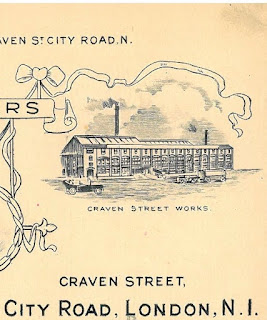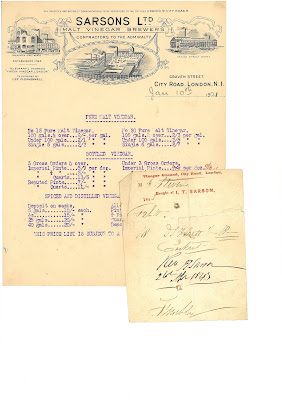The area now taken up by the Sutton Estate, at the junction of City Road and Old Street was known in the 1940s as the Vinegar Ground.
The Sarson’s Vinegar factory was based on the site of Champions Vinegar works which had long gone when the first houses were built there.
The vinegar was first brewed by Thomas Sarson in 1794 from malt barley. James Thomas Sarson was a vinegar maker living at Brunswick Place, Islington in 1841.
The name of the factory was called Craven street works as seen on a receipt from 1843 which I have included in this post. What was once Craven street Is today Cranwood street, but as you can see from various posts the location Sarsons vinegar works laid on Catherine street from 1893.
The site in this photo is champions vinegar works which was much larger in scale and occupied the corner of City Road and Old street. But to the left of the photo is Catherine street where Sarsons traded from in 1893, this photo below dates from 1880s.
The name of the factory was called Craven street works as seen on a receipt from 1843 which I have included in this post. What was once Craven street Is today Cranwood street, but as you can see from various posts the location Sarsons vinegar works laid on Catherine street from 1893.
The site in this photo is champions vinegar works which was much larger in scale and occupied the corner of City Road and Old street. But to the left of the photo is Catherine street where Sarsons traded from in 1893, this photo below dates from 1880s.
Going back sales rocketed when his son Henry James Sarson took over in 1850.
Sarson & Son branded its product as “Virgin Vinegar” from 1861 in order to indicate its purity at a time when food adulteration was rife. Most vinegar brewers added sulphuric acid to their product to decrease the necessary fermentation period.
It was renamed "Sarson's Virgin Vinegar" in 1884.
Sarson & Son did not add caramel to darken their vinegar, unlike most brewers, so their product had a much lighter colour than its rivals.
In 1893, the company was trading under the name of Henry Sarson and Sons from "The Vinegar Works", Catherine Street, City Road, London. Two of Henry's sons, Henry L Sarson and Percival Stanley Sarson also joined the family business as vinegar brewers.
A print of a cartoon dates from 1893 entitled "The Irony of Circumstance", featuring 'acetic faced women' in front of sign which reads "Virgin Vinegar". I have included this cartoon it was featured in the Sketch Newspaper.
Henry Sarson retired from the business in 1893. Henry Sarson & Sons had been converted into a private limited company by 1900.
A Sarson's Virgin Vinegar colour advertisement postcard survives from the 1900s for a campaign entitled " She would have Sarsons”. And from the 1930s and 1940s there is a photograph of a Sarson's vinegar truck and 49 photographs of the works, in a collection created by British Vinegars Limited and are held in the London Metropolitan Archives.
The slogan used to advertise the product is "Don't say vinegar - say Sarson's".
In 1932 the company merged with other British vinegar producers to form British Vinegars Ltd. The 20th century was the golden age of vinegar. 65 licensed breweries existed in the UK. However, by 1940, only Sarson’s remained.
In 1968, British Vinegars purchased a site from the Co-op in Middleton, Greater Manchester and production moved there.
Analysis report
Inland Revenue Map Date:1910
Source: Layers of London
OS Map Date:1893-1896
Source: Layers of London
OS Map Date: 1940s-1960s
The map now shows the vinegar works now demolished and occupied
by Sutton Dwellings
Source: Layers of London
City road part of site where the vinegar works was once situated
Enlarged copy of receipt showing Craven street works In 1843
Advertisement
Sarson’s Vinegar
Date: 1893
"The Irony of Circumstance", featuring 'acetic faced women' in front of sign which reads "Virgin Vinegar". I have included this cartoon it was featured in the Sketch Newspaper.
Advertisement Date:1919
Home Pickling Booklet by Henry Sarson Date: 1949
Sarson’s receipt date: 1843
Company stationary receipt date: 1921













No comments:
Post a Comment
Note: only a member of this blog may post a comment.